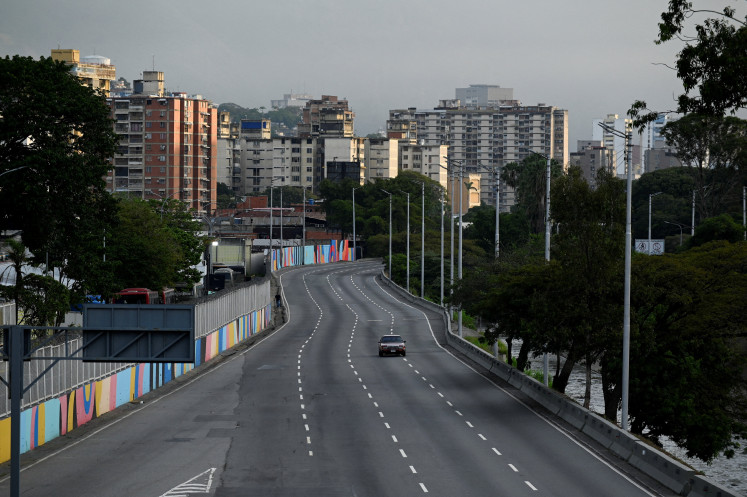Popular Reads
Top Results
Can't find what you're looking for?
View all search resultsPopular Reads
Top Results
Can't find what you're looking for?
View all search resultsThe Internet and regime security
Controversy over the Internet has remained rife decades after it became public
Change text size
Gift Premium Articles
to Anyone
C
ontroversy over the Internet has remained rife decades after it became public. During the 1990s, we witnessed the spread of the technology to almost every part of the world, giving the people access to a nearly unlimited flow of information and new ways to communicate with each other.
On the other hand, such freedom has often been met with the never ending effort of authorities to limit or put boundaries on their own people. Responses taken by governments vary from implementing certain regulations on the use of the Internet to restricting certain content deemed threatening or sensitive. Others have gone even further by applying a total shut down, preventing the public from accessing it.
The latest discourse raised by the State Intelligence Agency (BIN) on the need to monitor social networking websites such as Twitter and Facebook is evidence of the endless conflict between freedom and state security.
There is clearly a common concern among those authorities on the power of the Internet; the power derived from its very own nature: Its accessibility and influence upon people. The recent phenomenon of a whistle-blowing website, WikiLeaks, has caused significant distress to many governments all over the world.
In addition, the mass use of social media — some that also acts as whistle-blowers — has also added weight to this concern. Although very much contentious, it is understandable that some then see the Internet phenomena as a “non-military security threat”, due to the “damage” it may or has done.
When dealing with the concept of security, one might have the tendency to misinterpret its meaning, due to the wide spectrum of its definition. The traditional notion of “security” as an academic concept was at the very beginning considered identical to “national security”.
Simply put, when speaking about national security, one will seek to ensure the survival of a nation or a state against external threats — something described as military threats from other states.
The main reason such narrow coverage of “security” dominated the academic as well as policy debates during the Cold War was because the main international actors at that time — the US and Soviet Union — were quite well-established.
They did not have to pay attention to vulnerabilities; That is, threats coming from the domestic side of the state. As a consequence, they could and had to focus on external threats in the form of military threats from each of their own rivals. Despite the concept of security widening in the post-Cold War era, military threats are still considered one of the most important elements in defining national security.
A completely different understanding, however, can be found within the Third World countries. Yong-Pyo Hong (2000) explained that to most developing countries, internal threats are as important as, if not more important than, external threats.
Those threats from within the State are defined as political weakness, economic underdevelopment and social cleavages.
Although these phenomena mostly happen in authoritarian states, it might also take place in democracies such as Indonesia. The keyword used is political legitimacy; that is to say that any government whose political legitimacy is weak would seek to strengthen its position by any means necessary.
Clear distinction can be drawn from both definitions. The first focus more on the state as the referent object of security.
It deals with the survival and the well-being of the whole nation bound in the form of a state.
Meanwhile, the second deals only with the survival of a certain government or regime by removing any possible threats that may endanger its already fragile legitimacy, hence the name Regime Security.
Consequently, when something is declared a threat to security, the question that follows should be: Whose security?
There are two sides on which the Internet stands. It must be acknowledged that the Internet may act as an imminent threat to security. The past two decades have shown a growing concern on various forms of cyber crime, with targets ranging from the governments to the people.
In some cases, the attacks have a wide impact, therefore, they can be considered a security threat. However, this does not represent the entire realm, therefore cannot be valid ground to deem the whole network a threat to national security.
On the other hand, Manuel Castels (2001) claimed that the Internet has become an indivisible element of the social movement in the network era. The Internet has provided a medium for ordinary people to engage in the struggle to promote universal values: Human rights, democracy, social justice, the environment and so on. In other words, it has become a medium for spreading ideas to and creating awareness for the people all around the world, including those under the ruling of authoritarian regimes.
Such an argument is most evident in the recent regime changes in the Middle East. Regardless of arguments attempting to prove that regime changes occurred by design, it is interesting to see global support from the people toward those who are struggling and under oppression in those states.
From news sites to social networking sites, they have been spreading the word from the inside to the people all around the world about what is happening; and support has resulted.
Considering that situation, an Internet shut down is a logical action that can be taken by the regimes. The aim was clearly to prevent the public from earning and spreading information regarding their countries, therefore limiting domestic pressure on the sitting regime.
In the situation where their political legitimacy is already at stake, those regimes cannot afford other challenges delivered through the Internet, thus cutting their people’s access to it is the best measure.
From this experience, the lesson that can be learned is that the notion “security” must not be taken for granted. “Security” has the consequence of expanding state power and authority over the referred issue, and this includes taking any means necessary to contain any threat it may cause.
Unfortunately, the nation does not always share the same security concern as the ruling regime, therefore, the people have every right to deny any securitizing move made by their governments.
This also applies in the attempt made by certain governments to declare the Internet a threat to security. Particularly because, when they speak about it, they do not always refer to national security, but their very own regime security instead.
The writer is an assistant lecturer in international relations at the University of Indonesia in Depok, West Java.










